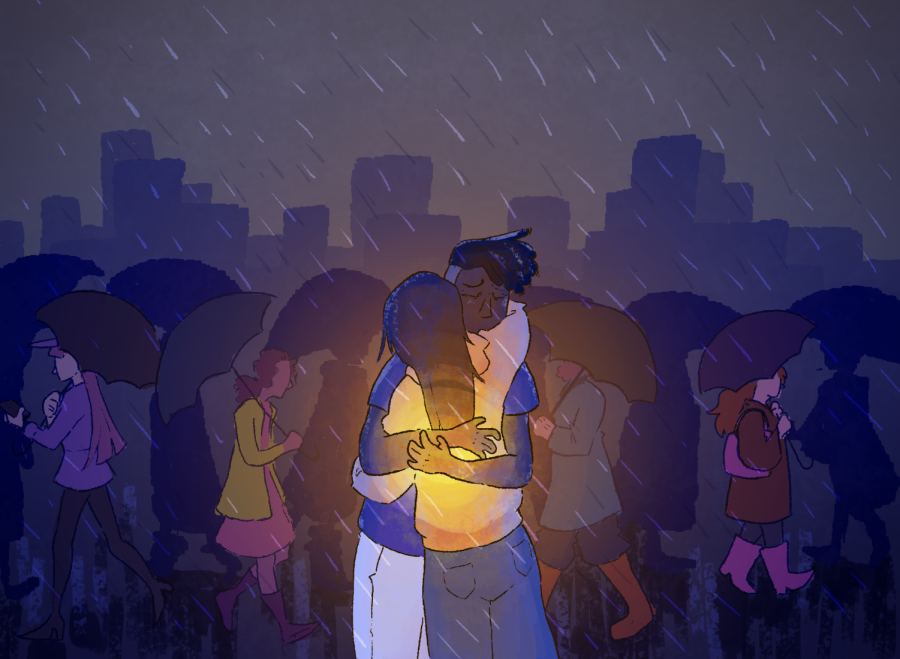Editorial: Dear students, don’t let doom consume you
Two people hugging as others walk by on a rainy and gloomy day. With traumatic events constantly happening, remember to take care of yourself and those around you.
February 26, 2023
As the 15th anniversary of the shooting at NIU and images of the Feb. 13 Michigan State University shooting loom over our heads, it’s hard for students to return to our everyday lives.
Of course, these events and others like them cause stress. It’s obvious that traumatic events stress out those involved, but they cause tension to those who are watching them too.
Stress has become a major part of modern life. The American Psychological Association reports that 27% of Americans feel too stressed to function most days. This statistic gets even worse when looking at the age distribution of this statistic: Approximately half of the people aged 18 to 44 feel too stressed to function.
The study shows what high levels of stress can do to one’s physical health. Approximately 76% of Americans had health impacts due to stress in the month before the study was taken and statistics show that there is a 30% to 40% increase in the chances of illness when stress is involved.
There are clear causes for this stress.
This year alone at the time of writing there have been 90 mass shootings in the United States, according to the Gun Violence Archive. 90 shootings is the most ever reported in a 60-day time span.
As we connect more with our society and our world through social media, we get continually more and more stressed.
With these traumatic events happening more often, it’s easy to fall into the loop of doom scrolling or spending all of your time in bed. Though this may give a momentary lapse of peace, these coping methods do nothing but delay the negative consequences to our mental health.
With the world becoming more and more stressful, there are a few things we should do to help limit the effect that stress and trauma have on our lives.
The simplest way – in language, not in action – to fight against steadily growing feelings of doom is to ensure that we don’t numb ourselves of our emotions.
If you need to cry, let yourself cry. If you need to scream, let yourself scream. Validating your internal emotions is a great way to keep emotions under control.
While there is a common internet joke of people telling others to “touch grass,” this advice may be helpful. Going outside can have great effects on one’s mental health.
In a review of the connection between nature and wellbeing for the International Journal of Wellbeing, Colin Capaldi, Holli-Anne Passmore, Elizabeth Nisbet, John Zelenski and Raelyne Dopko say that “connecting with nature should support human wellbeing and functioning.”
Exercising is a great way to get emotions like anger and sadness out while also working on your physical health. At NIU, the Recreation Center is free for students and has resources and exercise equipment.
The Mayo Clinic found that though the science on the connection isn’t settled, it’s clear that there is a positive connection between exercise and increased mental health. While they recommend over 30 minutes of exercise three to five days a week, any amount helps.
While it is hard to be around people when stress is high, it is of utmost importance. Being part of a strong community is a great way to keep your faith in humanity. Additionally, the other people in the community can come together to help when stress gets high.
A great way to combine exercise, being outside and finding community is to create or join a group organization. Sports and other exercises like running and biking are great on their own, but when done in a group setting, they offer even more help in working against negative mental health symptoms.
NIU has groups like the Campus Activities Board which can help you find places and events on campus in order to build a community. Outside of events, Huskie Hub has a list of every student organization on campus and gives information on what each one is and how to sign up for them.
Rest is also key. While all of these solutions are helpful, without rest applying such solutions will quickly lead to burnout. Rest, both in the form of sleep and self-care such as reading and meditation, is key to mental health, especially in times of mental health struggles.
To the students at Michigan State University: We feel your pain. We are thinking of you, and we hope you can process, take care of yourself and heal.



